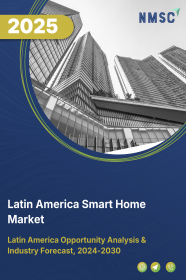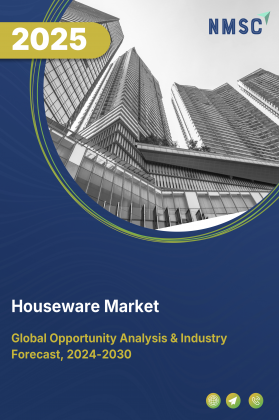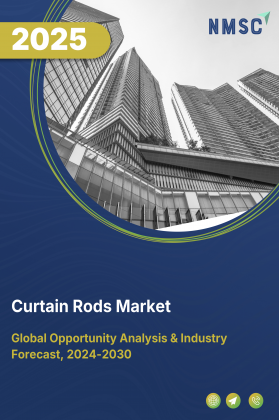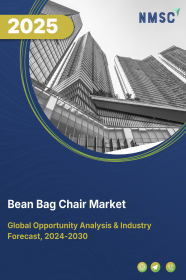
Latin America Smart Home Market by Product Type (Smart Lighting, Smart Home Security and Surveillance, Smart Entertainment, and Smart Appliances), by Communication Protocol (Wifi, Zigbee, Z-wave, Bluetooth, and Thread), by Smart Home Hubs (Standalone Hubs, and Built-in Hubs), by Voice Assistants Integration (Amazon Alexa, Goggle Assistant, Apple Siri, and Others), by Smart Home Compatibility with Smartphones (iOS, and Android), and Others – Opportunity Analysis and Industry Forecast, 2024–2030
Industry: Retail and Consumer | Publish Date: 06-Oct-2025 | No of Pages: 189 | No. of Tables: 192 | No. of Figures: 137 | Format: PDF | Report Code : RC2287
Market Overview
The Latin America Smart Home Market size was valued at USD 5.24 billion in 2023, and is predicted to reach USD 17.78 billion by 2030, at a CAGR of 19.1% from 2024 to 2030. A smart home, also known as a connected home, refers to a residence equipped with advanced technology and automated systems that enable the monitoring and management of various household appliances, devices, and security components through a centralized network. These smart devices are controlled remotely and often respond to voice commands or preset schedules, improving convenience, energy efficiency, and home security. Typical features of connected homes include smart thermostats, lighting systems, security cameras, voice-controlled assistants, and other interconnected devices designed to elevate the overall living experience.
Growing Penetration of Internet of Things (IoT) Propels Market Growth
The increasing adoption of Internet of Things (IoT) devices is a major catalyst driving the growth of the smart home market in Latin America. IoT technology facilitates real-time communication between interconnected devices, enabling automation and centralized control of various household functions such as lighting, security, and climate management. This seamless connectivity enhances the overall convenience and functionality of residential environments.
As more households integrate IoT-enabled solutions, the demand for fully connected and responsive home systems continues to rise. The ability to monitor and manage devices remotely not only improves energy efficiency and safety but also aligns with changing consumer expectations for modern, tech-enabled living. This trend is accelerating the expansion of smart home ecosystems across the region.
Government Initiatives and Smart City Projects Drive Market Expansion
Government initiatives play a vital role in shaping the smart home landscape by promoting the adoption of digital technologies for improved living standards. Through regulatory frameworks, infrastructure development, and incentive programs, public sector support encourages homeowners and developers to invest in smart home solutions that contribute to energy efficiency, security, and sustainability.
In parallel, smart city projects are integrating connected technologies into urban development, creating a favorable environment for smart home growth. These projects prioritize digital transformation in city planning, fostering awareness and demand for smart systems in residential areas. As a result, smart home adoption is becoming an integral component of broader efforts to modernize urban living in Latin America.
Security and Data Privacy Concerns Represent a Significant Challenge to Market Growth
The increasing integration of connected devices within residential settings has introduced critical vulnerabilities in the smart home ecosystem. Devices such as thermostats, cameras, and door locks are particularly exposed to cyber threats, often due to weak passwords, outdated firmware, or poorly secured home Wi-Fi networks. These security gaps make it easier for hackers to gain unauthorized access and exploit system weaknesses.
Such breaches can lead to the manipulation of connected devices or unauthorized access to sensitive personal data, posing serious risks to resident privacy and safety. To mitigate these concerns, smart home users must implement strong cybersecurity practices, including regular software updates, advanced password protocols, and secure network configurations. Addressing these challenges is essential to maintaining consumer trust and ensuring the continued growth of the smart home market in Latin America.
Integration of Blockchain Technology Into Smart Home Devices Presents Lucrative Opportunities for Market Expansion
Blockchain technology offers strong potential to enhance the security, transparency, and control of smart home systems. With its decentralized structure and encrypted data protocols, blockchain allows for secure storage and management of sensitive information, enabling users to define and manage access permissions with greater precision. Device identity verification through blockchain ensures that only authorized components operate within the connected home network, while tamper-proof smart contracts automate tasks reliably and securely.
In addition to improving security, blockchain decentralizes device control, reducing reliance on central servers and minimizing points of failure. This decentralized approach addresses key vulnerabilities and simplifies permissions management across multiple devices. As privacy and data protection become top concerns for consumers, the integration of blockchain technology is expected to play a crucial role in building trust and driving adoption—unlocking substantial growth opportunities for the smart home market across Latin America.
Competitive Landscape
Several market players operating in the Latin America smart home industry include Amazon (Echo/Alexa), Google Nest, Schneider Electric, Legrand Group (Netatmo), TP-Link (Tapo/Kasa), Xiaomi (Mi Home), Intelbras, Positivo Casa Inteligente, Somfy, Sonoff (ITEAD), Resideo Technologies Inc. (Honeywell Home), Bosch Smart Home, ABB Smart Home Solutions, Lutron, Fibaro (Nice Group), and others.
Latin America Smart Home Market Key Segments
By Product Type
-
Smart Lighting
-
Smart Bulbs
-
Smart Light Strips
-
Smart Switches
-
-
Smart Home Security and Surveillance
-
Smart Cameras
-
Video Doorbells
-
Smart Locks
-
Security System
-
-
Smart Entertainment
-
Smart TVs
-
Smart Speakers
-
Streaming Devices
-
-
Smart Appliances
-
Smart Refrigerators
-
Smart Ovens
-
Smart Washing Machines
-
Smart Dishwashers
-
Smart Home HVAC Management
-
Smart Rice Cooker
-
Smart Pantry/Storage System
-
Smart Blender
-
Other Smart Appliances
-
By Communication Protocol
-
Wi-Fi
-
Zigbee
-
Z-wave
-
Bluetooth
-
Thread
By Smart Home Hubs
-
Standalone Hubs
-
Built-in Hubs
By Voice Assistants Integration
-
Amazon Alexa
-
Google Assistant
-
Apple Siri
-
Others
By Smart Home Compatibility with Smartphones
-
iOS
-
Android
By Installation
-
DIY Installation
-
Professional Installation
By Sales Channel
-
Online
-
E-Commerce Platforms
-
Company Websites
-
-
Offline
-
Retail Stores
-
Supermarkets and Hypermarkets
-
Specialty Stores
-
By Region
-
Latin America
-
Brazil
-
Mexico
-
Argentina
-
Colombia
-
Chile
-
Peru
-
Other Countries
-
Key Players
-
Amazon (Echo/Alexa)
-
Google Nest
-
Schneider Electric
-
Legrand Group (Netatmo)
-
TP-Link (Tapo/Kasa)
-
Xiaomi (Mi Home)
-
Intelbras
-
Positivo Casa Inteligente
-
Somfy
-
Sonoff (ITEAD)
-
Resideo Technologies Inc. (Honeywell Home)
-
Bosch Smart Home
-
ABB Smart Home Solutions
-
Lutron
-
Fibaro (Nice Group)
Report Scope and Segmentation
|
Parameters |
Details |
|
Market Size in 2023 |
USD 5.24 Billion |
|
Revenue Forecast in 2030 |
USD 17.78 Billion |
|
Growth Rate |
CAGR of 19.1% from 2024 to 2030 |
|
Analysis Period |
2023–2030 |
|
Base Year Considered |
2023 |
|
Forecast Period |
2024–2030 |
|
Market Size Estimation |
Billion (USD) |
|
Growth Factors |
|
|
Companies Profiled |
15 |
|
Market Share |
Available for 10 companies |
|
Customization Scope |
Free customization (equivalent up to 80 working hours of analysts) after purchase. Addition or alteration to country, regional, and segment scope. |
|
Pricing and Purchase Options |
Avail customized purchase options to meet your exact research needs. |

















 Speak to Our Analyst
Speak to Our Analyst
























